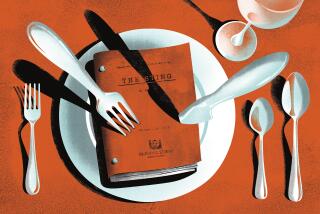Eddie Little, 48; L.A. Novelist and Journalist
- Share via
Eddie Little, whose first novel, “Another Day in Paradise” (1998), was a fictionalized account of his life as a drug addict, thief, con man and convicted criminal, died Tuesday of a heart attack in a Los Angeles motel room. He was 48.
Born in Los Angeles and one of three children, he said that his father, a schoolteacher, taught him to read by twisting his arms behind his back and squeezing tighter if he mispronounced a word. After that, Little said, he became a compulsive reader and writer.
He started sniffing glue at 10, ran away from home at 12, got arrested the first time at 15 and started his first novel 20 years later while he was serving yet another prison term.
The book, about a teenager’s introduction into a life of crime, was made into a 1998 movie starring James Woods and Melanie Griffith. Little went on to write a second novel, “Steel Toes” (2001), and a newspaper column, “Outlaw L.A.,” for the L.A. Weekly.
“The idea of the column was to show the underside of Los Angeles,” Howard Blume, Little’s editor at the L.A. Weekly, said Thursday. “So much of what goes on in the city is underground, under the table. There are people who live their whole lives unlisted.”
To write the column Little interviewed old acquaintances, prostitutes, professional burglars (“home invasion specialists”) and a convicted murderer. He rarely used his subject’s real name.
“Doing the fact-checking on Eddie’s column was very challenging,” Blume said.
Editors at the Weekly got used to Little’s unique presence. He once thanked a top editor for giving him his chance, saying, “Anybody ever messes with you, if you ever need help dealing with anybody, you call Eddie and I’ll take care of it.” (The editor said she thought she might like to have him in her office when she dealt with certain writers.)
Writing, Blume said, “was the center of Eddie’s life.”
“He could pull himself up to another level through his writing,” Blume said. “It gave him extreme joy. But he also had his demons.”
At the start of his first novel, a teenage crook named Bobbie describes his mentor, Mel, who teaches him how to crack a safe, force a door and set up a bogus checking account.
This “practical” education makes a new man of Bobbie.
Little seems hardly a step away from his made-up character when he writes:
“The American dream in person -- hustling, stealing to steal; blowing the cash as fast as I could get it; shooting speed ‘til my nose bled, ‘til my eyes crossed -- ether fumes rolling out of my lungs like clouds of toxic waste ... amphetamine psychosis in full bloom; giving money away; giving drugs away and always stealing so I’d have more for me and more for the borderline crazies, buzzed-out junkies, psychotic scooter trash, ex-con vet -- Vietnam vet -- ‘kill ‘em all, let God sort ‘em out’ fools and dope fiends I ran with, looked up to and loved like a normal person supposedly loves his brothers.”
Reviewers placed Little among a small, contentious group known as “outlaw writers,” whose personal stories turn on drugs and crime.
“Eddie wrote about what he lived,” Los Angeles writer and editor David L. Ulin said Thursday. “There is no contrivance in it. He was saying, ‘This is my life story and I need to tell it.’ ”
Ulin said that Little’s book and others in the same vein -- he mentioned James Fogle’s “Drugstore Cowboy” as one, serve a purpose.
“They humanize a dehumanized sector of society,” Ulin said.
Little was a gnarly looking man with arms like anvils covered in tattoos and one leg shorter than the other from a motorcycle accident.
He spent most of his adult life on probation or in prison, convicted of phone fraud, robbery, assault and drug possession, among other crimes.
Yet, he attracted a wide range of friends and admirers who describe him as a warm and engaging man with many good intentions, along with broken promises, behind him.
“Eddie did a lot in his life he wasn’t proud of,” said Brandi Kenyon, his fiancee. “He seemed so macho, but he was a good guy.”
In a 1998 interview with Terry Gross for National Public Radio’s “Fresh Air,” Little talked about his work with a volunteer group, We Care, visiting AIDS patients.
“I’ve always, even at my worst, I would always, like, want to help other people, be of service,” he said.
He referred Gross to “Another Day in Paradise.”
“There’s a line in the book: I perceive myself as like a little dope fiend Robin Hood,” he said.
He managed to stay off drugs for years at a time, but never broke his heroin addiction.
Rita Fabra, a longtime friend who had a child with him, also named Rita, said happiness and success had a reverse effect on him.
“If Eddie was on top of the world, he thought he didn’t deserve it,” Fabra said after hearing of Little’s death. “A sadness would come over him and I’d know, he was going back.”
Little is survived by his daughter, mother, stepfather, a brother and a sister. A private burial service is planned for later this month.
A gathering in his honor will be held at 6 p.m. next Thursday at Boardner’s Bar, 1652 N. Cherokee Ave., Hollywood. Several other memorial services are being planned.
“For a man who felt so alone,” Kenyon said, “he had so many people who loved him.”
More to Read
Sign up for our Book Club newsletter
Get the latest news, events and more from the Los Angeles Times Book Club, and help us get L.A. reading and talking.
You may occasionally receive promotional content from the Los Angeles Times.







